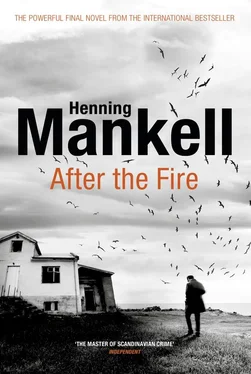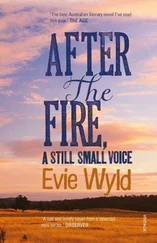Veronika had sprained her foot falling off her horse during a trek in Iceland, and had come back limping. She said what we all knew: that we could only guess at the identity of the perpetrator. There was a significant risk that we would start looking for a scapegoat and spreading even more toxic rumours.
What did I say — the doctor with a daughter who was a pickpocket in Paris? I didn’t agree with the young fisherman, nor did my views match those of Annika Wallmark.
I said nothing. The meeting and all those voices turned into a labyrinth, simultaneously threatening and reassuring. We would keep an eye on each other’s houses, we would watch any unfamiliar vessels with eyes more used to looking out for seabirds during the hunting season. We had shifted every last scrap of suspicion from ourselves to those nameless individuals who had invaded our country.
I said nothing, but as Wiman began to draw the meeting to a close I experienced an unfamiliar, nasty taste in my mouth. I thought about Louise and her Ahmed; if he had turned up here and heard how he was regarded, as a representative of all those foreigners, I’m sure he would have fled. Would I have been able to defend him?
Something unfamiliar was hiding beneath the surface I knew so well, and it frightened me.
I walked back to the boat with Jansson. It was dark by now. We could hear muttered conversations here and there between those who had been at the meeting; the breath coming out of their mouths was like a series of smoke signals.
Down on the jetty there was a little shed where the association stored its flags and flagpoles. I stood in the doorway as Jansson changed out of his suit and into warm maritime clothing. A bell rang in my head as I watched him, but I couldn’t understand why.
Jansson carefully folded up his suit and put it in a plastic bag. I still couldn’t work out what the situation reminded me of.
Something was bothering me, but what?
We went out onto the jetty; some of the boats were already on their way, their navigation lights showing. Someone was locking the doors up at the centre. Jansson and I nodded to one another, and he disappeared down the hatch to fire up his engine. I switched on my torch, pulled the cord to start my engine and set off for home.
The late afternoon was very cold. The ice had started to form in the inlets and along the coast. If the temperature continued to fall, most of the archipelago would soon be surrounded by ice.
Back in the warmth of the caravan, I was finally able to shake off the unpleasant feeling from the meeting. I had seen and heard people I thought I knew, but who had turned out to hold opinions I would never have expected.
What had I expected? What had I thought about these people’s view of the world beyond the islands?
I was sitting there with a cup of coffee, still unable to answer my questions, when Lisa Modin called. We had spoken a few times since the morning of New Year’s Day, but when I had wanted to go and see her or suggested that she should come to me, she had said no. I had been careful not to try and persuade her; I was afraid she might withdraw completely.
‘How was the meeting?’ she asked.
‘Who wants to know?’
‘I want to know.’
‘Lisa Modin or the journalist?’
‘We’re the same person.’
I had told her I was going to the meeting; after all, Kolbjörn Eriksson had called me when I was lying on her bed. But how could she know it was over and that I’d got home just a little while ago?
‘Who’ve you been talking to?’
‘I’m talking to you.’
‘How do you know the meeting is over?’
‘I guessed.’
I didn’t believe her. She must have spoken to someone; the only person I could think of was the woman no one listened to.
‘You’ve been talking to someone, and I know who it is. Annika Wallmark.’
‘I never reveal my sources.’
‘She pops up from behind her potter’s wheel, gossiping and talking about all kinds of stuff, and no one gives a damn.’
‘Why don’t you just tell me how the meeting went, instead of trying to get answers to impossible questions?’
‘It was well attended and we were all in agreement. We’re going to keep an eye on what’s happening to our neighbours’ houses. We islanders have added an eleventh commandment. We’re going to transform ourselves into vigilantes, so to speak. It sounds pathetic and it is pathetic, but it’s also true. It was Wiman, the priest, who said those words.’
‘Can you tell me any more?’
‘No.’
‘What was the atmosphere like?’
I had the feeling that she knew considerably more than she was letting on. Did she have other contacts? Jansson? Hardly. Nor the young fisherman who had started crying. Wiman, perhaps?
I realised I didn’t trust anyone who had been at the meeting. I tried to change the subject: when would she like to come and visit my caravan again?
‘Not yet.’
‘Maybe I’m too old and boring. It would be better if you just came straight out with it. Old doctors can usually cope with the truth.’
That was a lie. If anything distinguished us from other people, it was probably the fact that we were less well equipped to deal with the truth.
‘No,’ Lisa said. ‘You’re not too old. But both of us are solitary by nature.’
When the conversation was over, I went back to my cup of coffee. I still thought there was a chance that I might manage to break out of my loneliness through meeting Lisa Modin, in spite of everything.
I was aware of a growing sense of happiness. There was Lisa, there was Louise and there was the baby. I felt nothing yet for Ahmed and Muhammed, but perhaps it would come one day.
I lay down on the bed, with the radio quietly playing music that was supposed to be calming.
I had just dozed off when I woke with a start. At first I didn’t know why, but then I realised.
When Jansson called me after the New Year’s Eve party to tell me that the Valfridssons’ house was burning, he had said that he had been at home and had been woken up. And yet he had been wearing at least some of the same clothes from the party when I met him later, at the fire. I had reacted, but without giving the matter any further thought.
I lay in bed with the radio still playing. I recognised an old song: ‘Sail Along Silvery Moon’.
Thinking about Jansson’s clothes made me anxious, but I still didn’t know what it was that I had discovered.
It was like an unexpected reef in what I thought was a well-charted shipping lane.
The cold never loosened its grip during the week following Twelfth Night. Ice began to form in the bays and inlets. I still didn’t need an axe to cut a hole when I went down for my morning dip, but a thick mist lay just above the surface of the water, which was growing blacker by the day. Soon the ripples would turn to ice.
Two days after the archipelago meeting I was sitting in the caravan playing patience when I felt unwell. It was like a nausea in my head rather than my stomach. I left the cards, put on my jacket and went outside. I didn’t know what was wrong. I had spoken to Louise the previous evening, and everything was fine. She promised to send me some new pictures of Agnes. When I asked if she and Ahmed needed any financial assistance, she just laughed and said she would let me know when poverty really moved into their apartment.
I had also spoken to Lisa Modin; she was in her car on the way to Stockholm, so it had been a short conversation. She was going to a school reunion, having accepted the invitation after much hesitation. She promised to call me when she got back.
I walked around the island. The frost sparkled like glass on the site of the fire and the blackened remains of my house. I went up to my grandfather’s bench, pulling on the gloves that were in my pocket.
Читать дальше












